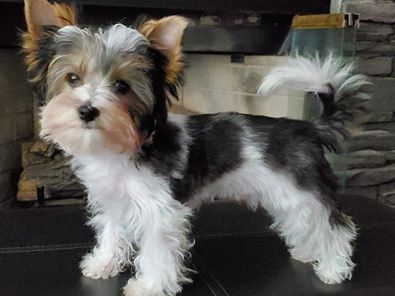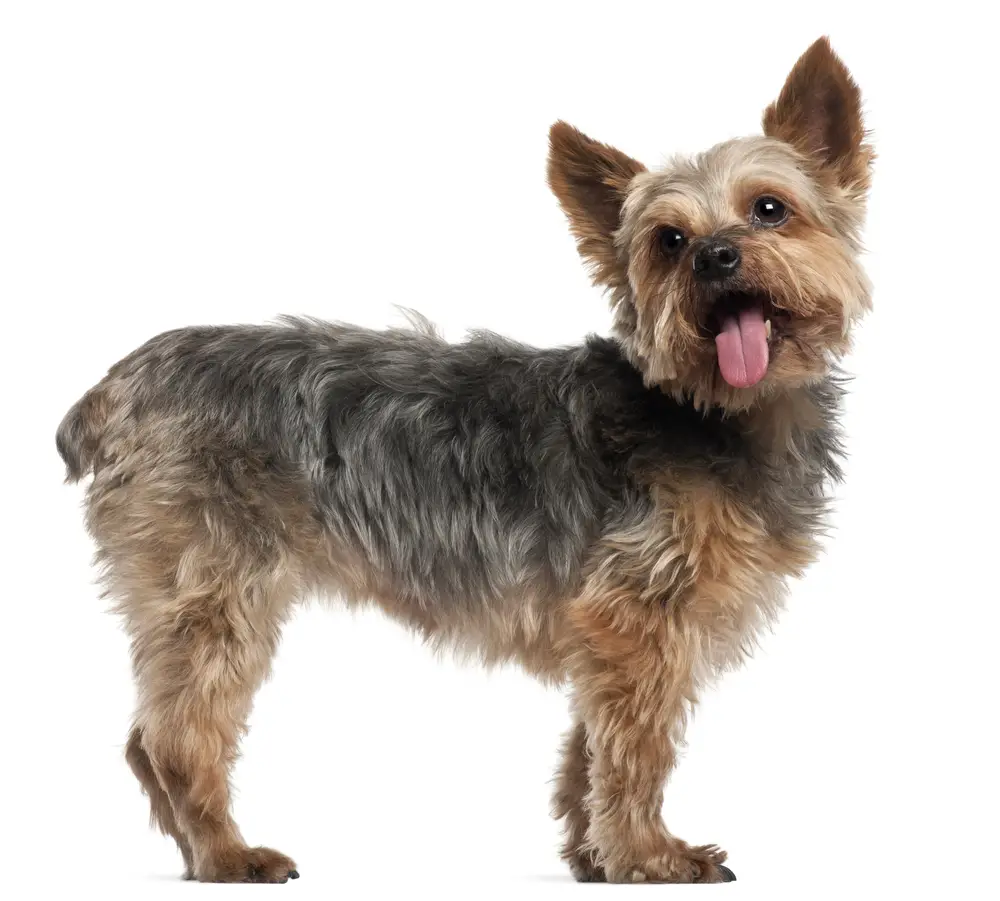Yorkie Temperament & Behavior Characteristics
Yorkie Temperament & Behavior Characteristics

Mickey – Courtesy of Richard Cappiello
Out of 90 breeds, the Yorkie ranks 17th in terms of intelligence. The Yorkshire Terrier is one of the most intelligent breeds and known for its quirks and fun personality. As a Yorkie owner, you will need to invest the time to understand your Yorkie to provide a comfortable lifestyle and build fun memories. As you get to know your Yorkie, you’re bound to develop a strong bond that will never be broken!
General Temperament of a Yorkshire Terrier
The Yorkie’s intelligence is higher than average. This makes them easy to train and great at communicating. They are energetic and incredibly independent as well giving them a very desirable temperament among dog breeds. Their courage is also evident as they pack ferocity in their petite size. So, don’t let the Yorkie’s size fool you as it is highly likely that strangers will be unwelcome in their turf!
Shaping Your Yorkie’s Behavior
Like all living beings, it is best to start molding your Yorkie’s behavior from a young age. The Yorkshire Terrier will begin to form its character and behavioral traits very early; the first three months of your pup’s life are most crucial in shaping Yorkie temperament.
During the first few months, it is essential to set boundaries and ground rules for discipline to help your Yorkie grow into a non-aggressive, well-mannered dog.
Many behavioral problems have a root in a dog’s early upbringing. Failing to address issues early on can lead to more serious problems like biting, very finicky eating, and accidents in the house down the road.
The best way to ensure that your dog has an outgoing personality with a zest for life is by teaching the pup about the importance of socialization. Yes, they are dogs, and this doesn’t mean that the owners should teach them how to curtsy and serve tea to guests (although that would be cool). Instead, you will need to teach your Yorkie how to get used to their surroundings. Introduce new things to your pup such as the noise from the television or the washing machine gradually to avoid phobias or fears of loud noises.
Another way to ease the pup into its surroundings is by introducing a lot of human touches. You should pet and hold your puppy often and give him regular grooming. This makes your pup comfortable with human touch. Dogs are generally intelligent beings and they can understand the tone of human speech as well. To ensure bonding, talk to your dog in an appropriate tone so they can understand how you’re feeling.
Don’t keep your Yorkie in a cage or kennel; this will backfire and may lead to fear and even aggressiveness. Instead, a playpen like the IRIS 4-panel pet playpen is recommended because it gives your Yorkie their own territory and space to explore.
A dog that receives love and care grows confident in its surroundings and develops into an outgoing, friendly, and loving pet.
Yorkies Thrive on a Routine

Gizmo – Courtesy of Diana Zamarron
When you bring your Yorkie home, you are not just bringing an animal to your home but a living being with which you will coexist. It’s up to you to make sure that your pup feels safe and sound in its new environment. It’s also essential to establish a routine as soon as possible because Yorkies thrive on a predictable schedule and expectations.
You should establish a routine for tasks that involve feeding, walking, exercise, grooming, play and even quiet time.
Feeding your Yorkie on a schedule will help your pup maintain its diet and reduce possible digestive problems. Yorkies have specific dietary needs that go beyond what you feed them. Your Yorkie will do best on a routine with set meal times throughout the day and snacks or treats in between. If your Yorkie goes too long without food, they may vomit or experience digestion problems.
Walk times are also important, both for establishing a bond and for housebreaking your pup. Regular walks also help your Yorkie become more comfortable in his surroundings. Because Yorkies are known for their high energy level, unlike many toy breeds, don’t forget to include play time every day. Quiet time will also help your pup rest and prevent him from being oversensitized to sounds.
Establishing Dominance with Your Yorkie

Gracie Mae – Courtesy of Diana Zamarron
It’s important to show who is boss at home; otherwise, your Yorkie can misunderstand the love and care you show and believe he is in control. While Yorkies look nothing like wolves or even Laboradors, they’re all virtually the same: pack animals. An undisciplined Yorkshire Terrier that thinks he’s in charge can be a nightmare for you and your guests.
You don’t need to resort to harsh treatments to get their pet to understand who’s in control. Yorkies are smart creatures and they are very responsive to praises and positive reinforcement. Be sure to establish early what is and is not acceptable, such as biting, barking at visitors, meal time, and begging at the table.
As far as behavior goes, Yorkiers are fairly easy to train with a clicker like the one in this starter training set. You may also want to enroll your Yorkie in obedience classes to understand better how to establish dominance in your interactions and commands.
Quirks You May Notice
Yorkies are known for their funny personality and many have their own unique quirks. As a Yorkie owner, you may notice some of the following odd behaviors develop. Most aren’t cause for concern but they may need to be addressed with training or other strategies.
- Won’t walk on a leash. Does your Yorkie get nervous about walking on a leash? Make walk time fun and give them a treat at the start and end of the walk. Make sure you use a soft harness like this no-pull Pupteck harness instead of a collar because it may be painful for your pup.
- Picky eater. Yorkies can be very particular when it comes to food. Sometimes they may only want a particular type of food which may lead to an unbalanced diet. When switching brands, mix the two together for a while as you transition to the new brand. Don’t give your Yorkie table scraps, either.
- Eating grass. Some Yorkies simply love eating grass and act like a cow trapped in the body of a Yorkshire Terrier. This can cause vomiting and digestive issues. It may be caused by hunger, attention-seeking, or just an unusual habit your dog has developed. Make sure you supervise your pup in the yard and tug gently on their harness to distract them from eating grass. Reward them once they stop with a soft treat like these Blue Buffalo training treats.
- Dragging rear. Your Yorkie may drag or scoot their rear end on carpet or grass. This can be caused by constipation or irritation. It may also be a sign that your dog’s anal glands need to be expressed; your vet or groomer can help with this.
- Trembling or shivering. This usually means your Yorkie is scared or just cold. Yorkies have trouble regulating their body heat because they have just one coat, not two like most dogs. Yorkies also have hair, not fur. A dog sweater like this one for small breeds can help.
- Licking. Yorkies are affectionate beings. Your Yorkie may lick excessively as a sign of affection of submissiveness.

